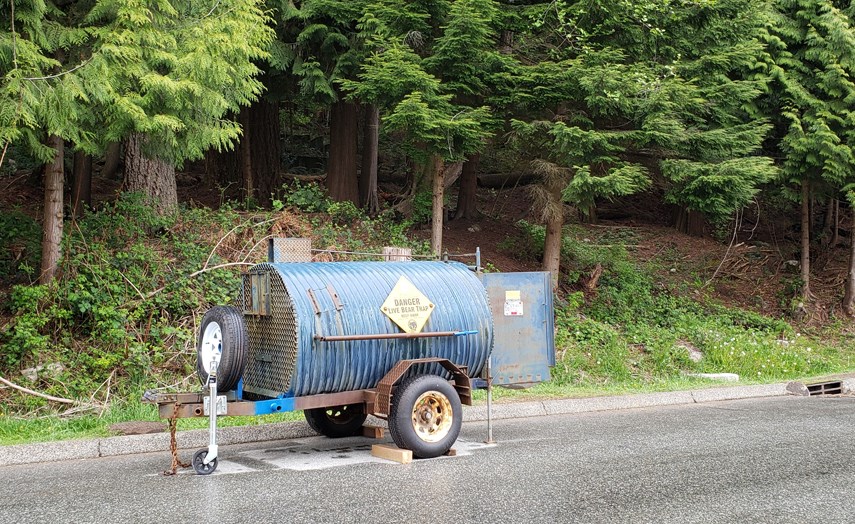2021 is shaping up to be bad news for bears if the number of early conflicts with humans is any indication, the North Shore Black Bear Society says.
The B.C. Conservation Officer Service has set up their first trap of the year to catch a large bear in the Braemar neighbourhood that has routinely been breaking into garbage carts.
“They confirmed that the bear will be killed,” said Luci Cadman, executive director of the Black Bear Society. “We’re very disappointed. … We've saturated that area with education.”
According to conservation officer Lonnie Schoenthal, the bear was showing no signs it could be hazed out of residential properties, even with bear bangers and an air horn, and it is likely a bear that has been developing bad habits since last year.
“It’s showing levels of habituation and obvious food conditioning with the amount of garbage it’s going after, rather than natural food sources. It poses a public safety risk. It's a risk that we have to manage as the COS,” he said. “Usually, for a bear, it takes time to get to that point.”
Even before the trap was set, Cadman and volunteers from the Black Bear Society were warning residents in all the usual hotspots across the North Shore that they were getting too many reports of unnecessary conflicts and attractants being left out – garbage carts, compost, outdoor fridges and freezers, bird feeders and pet food dishes.
“It's not looking very good,” she said. “It’s just constant.”
Cadman said the Black Bear Society also opposes killing bears when enforcement should be proactively targeting the people responsible for drawing them into the neighbourhood in the first place.
“Killing that bear is not going to solve a problem for anybody. It’s just going to leave a void that another bear will fill and the cycle just continues,” she said. “It's on residents that are failing to act on their responsibilities and on the Conservation Officer Service for providing this lethal solution … which isn't a solution. It just creates that entitled behaviour. It enables people to not manage wildlife attractants on their property.”
Because the District of North Vancouver’s garbage carts, which are bear resistant and not bear proof, were locked at the time, they are considered “secure” as far as the law is concerned, Schoenthal said.
Late last year, the District of North Vancouver adopted a zero-tolerance approach to residents who leave their garbage carts outside beyond the proscribed hours. Since then, district bylaw officers have issued 387 $100 fines for first-time offenders and 13 $500 tickets for subsequent offences.
Cadman said it is time for the province to revise its approach to wildlife management and training for conservation officers.
“The district bylaw is stronger than the Provincial Wildlife Act,” Cadman said, frustrated.
Beyond keeping properties free of non-natural food sources for bears, Cadman said North Shore residents need to change the way they interact with bears that do show up in local yards. The best response is to stand somewhere safe, make eye contact with the bear and let them know in a firm voice that they have to move on. Banging pots and pans, blasting air horns or setting off bear bangers is not only less effective, it can actually be counterproductive, she added.
“Your voice is the best tool,” she said.
Outside residential areas, Cadman warned that the increasing popularity of local trails is likely driving bears into backyards, looking for a quiet place to spend the day. And illegal trail work, especially on Mount Seymour, is also exacerbating the matter.
“We want people to be respectful and see that chopping down trees and clearing vegetation to make trails, that's having a big impact,” she said.
In 2020, conservation officers shot five North Shore bears, three were killed on the roads by drivers, and one was euthanized after becoming injured in a soccer net.
Residents can make a confidential report of a bear sighting or an attractant on the North Shore Black Bear Society’s Report It webpage.
The Wildlife Alert Reporting Program keeps track and shows whether it’s a sighting or a bear getting into attractants such as garbage and compost, bird feed, pet food and dirty barbecues.



.jpg;w=120;h=80;mode=crop)
